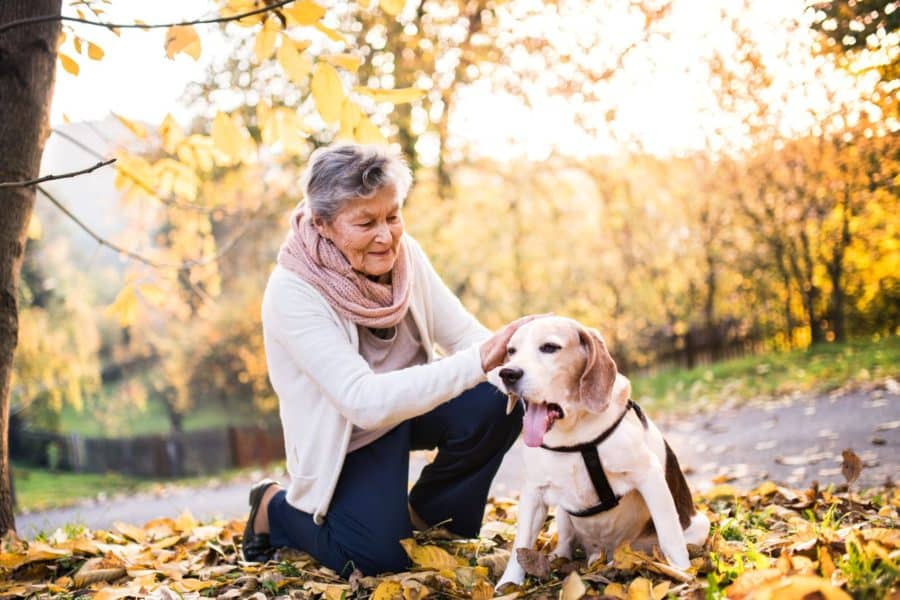Do you own a dog? If so, you’ve probably experienced the positive benefits like a more active lifestyle and better health. As you grow older, a dog helps reduce isolation and loneliness, conditions that put you at higher risk of early death.
While the benefits have been well documented, it is unclear what is happening inside your body as a result of owning your dog. Now, a unique three-way partnership between the Colorado Longitudinal Study (COLS), a University of Denver (DU) research team, and a Boulder biotech company, has developed a research study to quantify and understand the biological changes that keep dog owners healthier than non-dog owners. If the research receives funding, it could lead to the development of therapeutics that target the same mechanisms to improve health in all people with or without dogs.
“There is wide acceptance that companion animals improve the health trajectories of their owners, but the mechanisms underlying this observation are poorly defined,” says Kevin Morris, PhD, director of research for DU’s Institute for Human-Animal Connection (IHAC), who will lead the study. “By understanding the physiological pathways involved in health outcomes for both humans and dogs, the interactions between people and animals can be optimized to improve human health and it could lead to the discovery of new drug targets based on that natural interaction.”
A Colorado-Based Partnership
For the study, IHAC would partner with COLS and Boulder-based SomaLogic, Inc. (SL) to conduct a 5-year assessment of 500 dog owners and a control group of 500 people who do not own dogs. The assessment will collect blood, urine, and stool annually from participants as well as lifestyle and health information quarterly. Using state-of-the-art technology developed by SL, the research team will map more than 5,000 proteins in both humans and dogs. These protein maps, called proteomic profiles, reflect real-time changes in the biology of a person. Unlike many biobanks that are limited to storing only DNA, COLS will use advanced technology to collect and store biospecimens in a manner that preserves fragile molecules, such as protein, to enable this type of research.
“Most research today is limited by the data available in current biobanks to looking at a person’s biology once they develop disease, or sometimes prior to disease in people who have a genetic mutation that increases their risk of a particular disease,” says Phyllis Wise, PhD, COLS CEO. “In contrast, COLS will be collecting data on participants for years prior to disease development, which then allows researchers to look back in time to measure the impact of a particular factor on health, in this case dog ownership.”
In addition to researching the biological changes in dog owners, the project also would study whether dogs are sentinels for human health and aging. “Because dogs age at a faster rate than humans, it’s thought that dog health could predict human health,” Morris says. “If dogs are developing cancer in a community at a higher rate than average, that is potentially a sentinel that humans in that community also will develop cancer at a higher rate.”
This research project is impossible without the biological samples and health data that will be collected by COLS. Larry Gold, PhD, professor of molecular, cellular, and developmental biology at the University of Colorado Boulder and founder of SL, was the visionary behind COLS. Over his 40-year research career, Gold scoured the world’s biobanks to find high-quality longitudinal biological samples, collected and stored before and after the onset of all diseases. He realized that the resource he required did not exist, which lead to his vision for COLS.
Fort Collins to Be First COLS Recruitment Site
COLS expects to begin recruiting participants in the Fort Collins area in late 2021. In this first phase, COLS will recruit 16,000 Coloradans and begin collecting and storing their biospecimens and sociological, environmental, and health data for five years. After the first year, COLS will begin recruiting additional participants across Colorado representing the state’s diverse geography, ages, income levels, race, and gender, eventually growing to collecting data on hundreds of thousands of participants over 10 years or longer.
“Having this really comprehensive and large biobank of biological specimens and all of the clinical and demographic data associated with those specimens over a long period of time for each person is a treasure trove for researchers to dig through,” Morris says. “Our proteomics project alone shows ways to provide really valuable research that couldn’t be conducted with any other existing biobank.”
The three organizations behind this project are working together to explore funding opportunities from individual philanthropists, foundations, and state and federal funding agencies. At a local level, COLS is currently seeking individual donations to support the opening of its first Engagement Site in Fort Collins where the Phase I participants will be recruited for this study.
If you are interested in the work of COLS, please consider making a tax-deductible donation to COLS.

